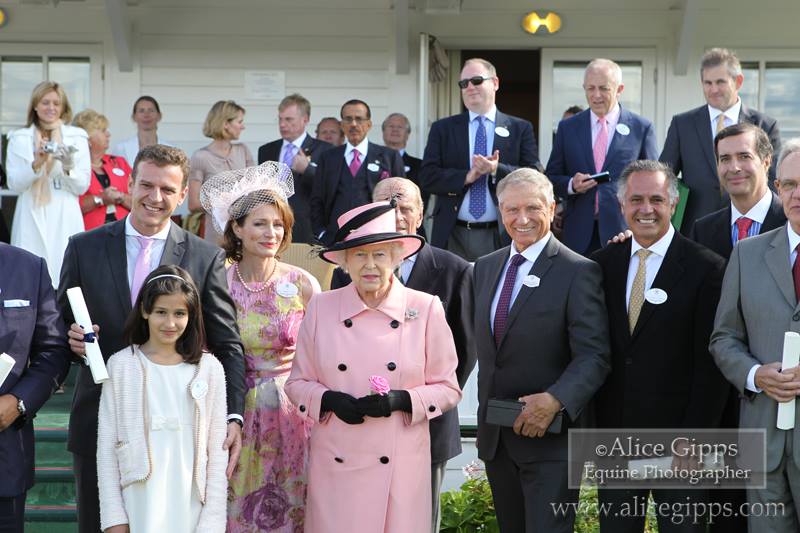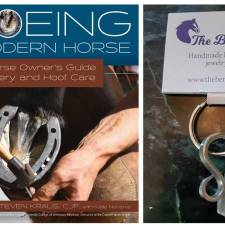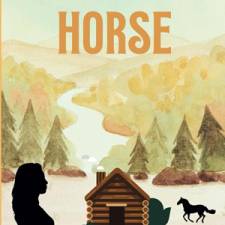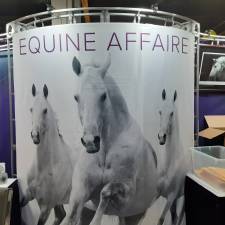
We present this article as we remember the history of Queen Elizabeth II and her love of horses. This article was originally published on MontyRoberts.com and is published here with permission.
August 31, 2020: For only the second occasion in history that the British Crown has awarded certificates for influential equine protection work, this recognition follows the acknowledgment of eight horsemen and women the Queen recognized in 2012. The Royal Family had planned to recognize this additional group in-person at Buckingham Palace, but the gathering and in-person presentation were postponed to a later date due to world events surrounding COVID-19.
Monty Roberts, founder of Join-Up® International and world renowned horse trainer, enlisted his Legacy Strategist, daughter Debbie Roberts Loucks to assist him with naming a stellar group of individuals who have worked tirelessly to learn and carry on the gentle and effective concepts that Queen Elizabeth witnessed in 1989 when Roberts demonstrated Join-Up and the introduction of the first saddle and rider to a young filly owned by the Queen’s mother.
Recognizing the value of Join-Up, Queen Elizabeth encouraged Roberts to demonstrate and train more horsepersons in these methods, setting him on a life’s mission that continues today, ‘to leave the world a better place for horses and for people, too’.
The recipients are:
Andreas Jacobs
for his extraordinary efforts to reduce violence in the training of horses by adopting Monty Roberts’ concepts and initiativesAnn Marie Marek
for her extraordinary efforts to assist veterans and first responders with post-traumatic stress through Monty Roberts’ concepts and initiatives
Caroline Jennings
for her extraordinary efforts to reduce violence in the training of horses and the development of youth leaders by adopting Monty Roberts’ concepts and initiatives
Denise Heinlein
for her extraordinary efforts to reduce violence in the training of horses, her dedication to assist veterans and first responders with post-traumatic stress and the development of youth leaders by adopting Monty Roberts’ concepts and initiatives
Ele Milwright
for her extraordinary efforts to assist veterans and first responders with post-traumatic stress through Monty Roberts’ concepts and initiatives
Ian Vandenberghe
for his extraordinary efforts to reduce violence in the training of horses by adopting Monty Roberts’ concepts and initiatives
Jake Harris
for his extraordinary efforts to assist Monty Roberts in the training of horses by adopting Roberts’ concepts and initiatives
Jamie Jennings
for her extraordinary efforts to reduce violence in the training of horses and her dedication to assist veterans and first responders with post-traumatic stress by adopting Monty Roberts’ concepts and initiatives
Jerry Sparby
for his extraordinary efforts to assist veterans and first responders with post-traumatic stress and the development of youth leaders by adopting Monty Roberts’ concepts and initiatives
Jim Goddard
for his extraordinary efforts to assist veterans and first responders with post-traumatic stress through Monty Roberts’ concepts and initiatives
Joanna Lowes
for her extraordinary efforts to reduce violence in the training of horses, her dedication to assist veterans and first responders with post-traumatic stress and the development of youth leaders by adopting Monty Roberts’ concepts and initiatives
Kelly Marks
for her extraordinary efforts to reduce violence in the training of horses by adopting Monty Roberts’ concepts and initiatives
Miguel Lupiano
for his extraordinary efforts to reduce violence in the training of horses, for his dedication to assist veterans and first responders with post-traumatic stress and the development of youth leaders by adopting Monty Roberts’ concepts and initiatives
Ron Ralls
for his extraordinary efforts to reduce violence in the training of horses by adopting Monty Roberts’ concepts and initiatives
Simon Marrier d’Unienville
for his extraordinary efforts to reduce violence in the training of horses, his dedication to assist veterans and first responders with post-traumatic stress and the development of youth leaders by adopting Monty Roberts’ concepts and initiatives
Simon Stokes
for his extraordinary efforts to reduce violence in the training of horses by adopting Monty Roberts’ concepts and initiatives
Marty Irby
for his extraordinary efforts to reduce violence in the training of horses by adopting Monty Roberts’ concepts and initiatives
“I am deeply honored and grateful to Her Majesty, and my friend Monty Roberts for their recognition – working to help the voiceless horses we all care so deeply about has been the greatest honor and privilege of my life,” Irby said, “The good news is, after decades of horse abuse, change may come.”
Irby added, “The ranks of reformers are swelling: Priscilla Presley, who shared a deep love for the Tennessee Walking Horse with Elvis, and who still maintains walkers on the grounds of Graceland to this day; Monty Roberts, “the man who listens to horses,” and his daughter Debbie Roberts Loucks have been working for years to get the Prevent All Soring Tactics (PAST) Act signed into law to end this abuse. I am certain that we will one day see the end of soring, doping, slaughter, and the use of whips in racing venues around the globe, and I hope that every horse lover will join me, Monty, and Queen Elizabeth II in helping eradicate all violence and abuse from the equine world.”
Roberts gave his perspective on his life’s journey leading to this honor which is to encourage individuals to carry on his advocacy for horses and their training:
“In 1939 at the age of four, I rode and competed in my first horse show. At 85 I have known no other life but that of life with horses. Four universities and two doctorates in behavioral sciences along with major education from the horses themselves, I have won 11 world championships from the saddle. I survived a violent childhood and sought to perfect the training of horses in the absence of violence. Queen Elizabeth observed my work in 1989 and directed me to take the concepts to the world. I have demonstrated my nonviolent principles in 41 countries with over 3000 individual horses now.”
The New York Times bestselling author and world-renowned horse trainer Monty Roberts is available for interviews.
MONTY ROBERTS first gained widespread fame with the release of his New York Times Best Selling book, The Man Who Listens To Horses; a chronicle of his life and development of his non-violent horse training methods called Join-Up®. Monty grew up on a working horse farm as a firsthand witness to traditional, often violent methods of horse training and breaking the spirit with an abusive hand. Rejecting that, he went on to win nine world’s championships in the show ring. Today, Monty’s goal is to share his message that “Violence is never the answer.” Roberts has been encouraged by Her Majesty Queen Elizabeth II with the award of the Membership in The Royal Victorian Order, as well as becoming Patron of Join-Up International. Other honors received were the ASPCA “Founders” award and the MSPCA George T. Angell Humanitarian Award and FEI’s Man of the Year. Monty was recently included as Horse and Hound Magazine’s Top 50 Horsemen of All Time. Monty is credited with launching the first of its kind Equus Online University; an interactive online lesson site that is the definitive learning tool for violence-free training.
JOIN-UP philosophies can be seen at work with both humans and horses across the world, from farms to major corporations. To learn more about Monty Roberts or the many applications of his Join-Up training methods, visit www.montyroberts.com. Horse Sense and Soldiers aired on Discovery Military in 2010 highlighting the therapeutic effect horses and Monty Roberts’ Join-Up® have on PTSD. Soon after Monty and his team developed the Horse Sense & Healing program for veterans and first responders. Lead-Up International was officially launched worldwide at the Monty Roberts International Learning Center in Solvang, California, in February 2017. The purpose of Lead-Up International is to reduce violence in the community by creating peaceful leaders from vulnerable youth utilizing equine-assisted therapy and non-verbal communication, building trust-based relationships.
This article was originally published on MontyRoberts.com and is published here with permission.












